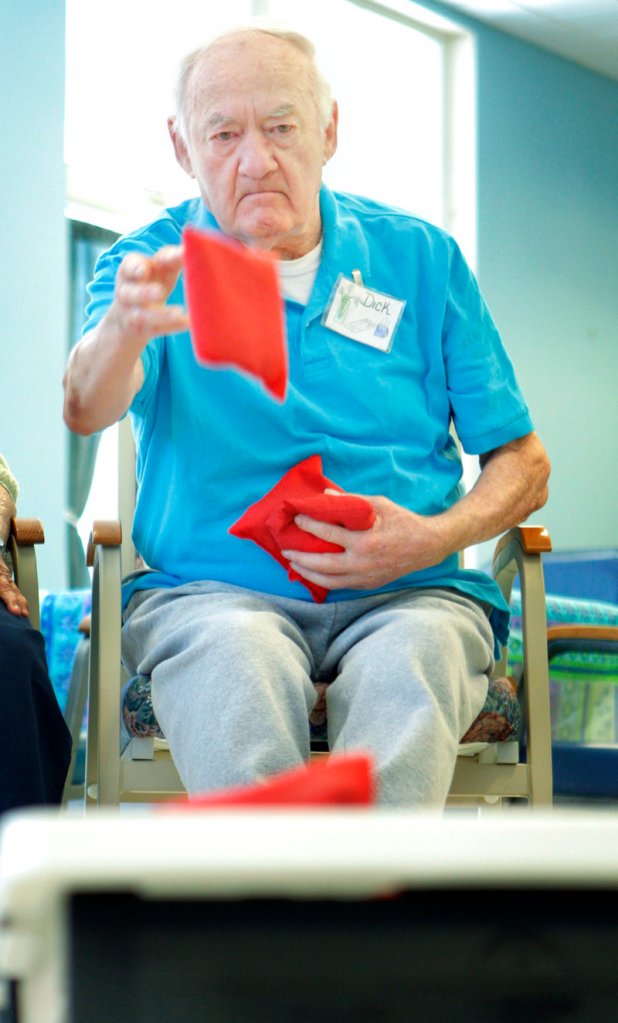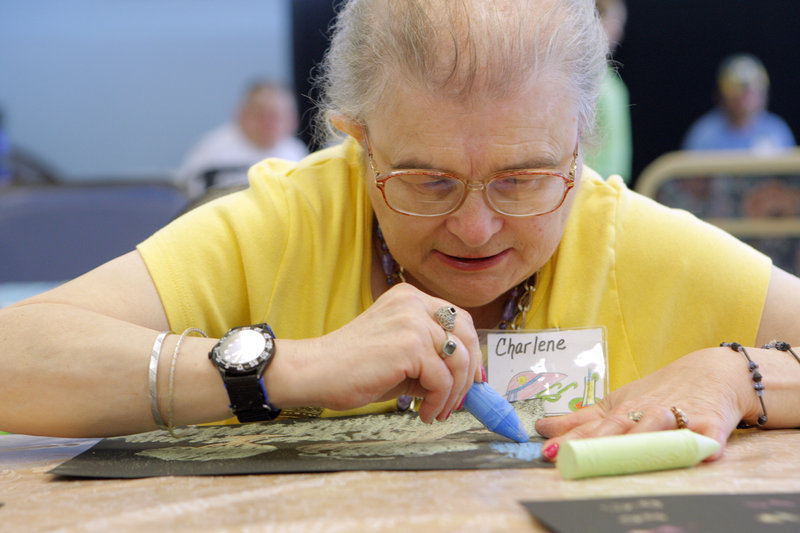SACO – When Alexandra Perrin was told her mother had Alzheimer’s disease, she knew they both needed help.
Her mother could no longer safely live at her home in Old Orchard Beach. But she had become frustrated and angry when living with Perrin and wanted to be independent.
Perrin, meanwhile, was an only child working full time and living two hours away in Brookline, Mass. She needed help navigating the medical, legal, financial and emotional maze of caring for an aging, ill parent.
“It’s overwhelming,” Perrin said. “I said, ‘I don’t know how to do this. I cannot do this by myself.’“
That overwhelmed feeling is a familiar one for a growing number of adults who are becoming full-time caregivers for parents with dementia or other age-related health conditions.
But, as Perrin found out, there is help out there. With the nation’s oldest population, Maine has an expanding network of support services, from free counseling, caregiver classes and support groups to full-service professional care managers.
Getting help to everyone who needs it is already a big challenge, with an estimated one-third of the work force now caring for another adult. And it is sure to get even more challenging as members of the baby boom generation begin turning to their own children for care. Alzheimer’s alone is affecting more than 30,000 Mainers and their families, and the number is expected to triple over the next 40 years.
Experts see it as an approaching health crisis — for the caregivers as well as their aging parents.
“Caregivers, we know for a fact, are more likely to be in real poor health themselves. They are more likely to be depressed. They are more likely to use alcohol and prescription drugs,” said Lenard Kaye, director of the Center on Aging at the University of Maine. “It’s physically hard. It’s mentally hard. It’s financially draining. It puts stress on all aspects of your life.”
And when caregivers are overwhelmed, both they and their parents are more likely to end up in doctor’s offices, hospitals or nursing homes.
“Caregivers without help are at a loss,” Kaye said. “They’re unprepared to do that.”
The biggest barrier to getting outside support, experts say, is the fact that caregivers often don’t know what help is out there. And some, especially men and older caregivers, don’t want to ask for it.
SENIOR-CARE CONSULTANT
By the time Perrin heard the word “Alzheimer’s” she was already struggling to care for her mother.
A geriatric nurse recommended a Portland-based senior-care consultant, Beach Glass Transitions.
The company guides families through the transition to home care, assisted living or nursing care and charges a fee depending on the help it provides. Several months of intensive consultation can cost about $3,000. Many of its clients, like Perrin, are long-distance caregivers, a common but especially complicated situation.
Perrin, who works in a salon in downtown Boston, remembers holding a cellphone to her ear, explaining to her mother that she was at work and couldn’t come right over, while at the same time giving a Brazilian bikini wax to a client with her free hand.
The investment in professional help saved money in the long run and allowed her to keep working and pay for her mother’s care in Maine, Perrin said.
“The first time you buy a home, you don’t know how to do it, so you go to a Realtor,” Perrin said. It’s the same thing with caring for an aging parent, except that the stakes are higher and it’s much more complicated and emotional, she said.
“You can’t make a mistake. It’s your mother,” Perrin said. “You need someone who knows the ins and outs.”
Lynn Peel, founder of Beach Glass, walked Perrin and her mother through the options, taking control of paperwork and deadlines, reassuring them when things looked hopeless, and ultimately helping get the high-quality care Perrin wanted for her mother.
“She talks you off the ledge,” Perrin said.
Perrin’s mother, Maggy Carlis, is now living in a comfortable room at Seal Rock Health Care in Saco. The nursing center has lifted Carlis’ spirits and eased her daughter’s mind.
Carlis, a 78-year-old former flight attendant, sometimes can’t remember a conversation 15 minutes later, but is well aware of the help she and her daughter got from Peel.
“She makes you strong,” Carlis said of Peel. “She makes you feel like ‘I can do it.’ “
GERIATRIC CARE MANAGER
Greg Griffin, a Cape Elizabeth lobsterman, turned to a different professional for help after his mother had a small stroke several years ago and he struggled as her live-in caregiver.
“I am not a caregiving kind of person. I defy you to go down on the waterfront and find any lobsterman who is,” Griffin said.
At the time, Griffin was recently divorced and had no siblings nearby. He had to keep setting and hauling traps to pay for his daughters’ college tuitions, but didn’t immediately seek out help because he didn’t know what was available and assumed that he couldn’t afford it, anyway.
“We didn’t have a whole lot of dough to unleash the cavalry on Mom,” he said. “I had kind of gone off and dealt with everything on my own, further than I would really recommend. It was out of a level of exhaustion and desperation … and fear that I gave Paula a call.”
Paula Banks is a Cape Elizabeth-based certified geriatric care manager, a full-service professional consultant who can do anything from coordinate medical care to mediate family disagreements.
“What Paula was able to do was kind of talk me down out of the upper tree branches up there,” Griffin said.
The cost of hiring geriatric care managers varies. Banks, who has decades of experience, including clinical care, charges $135 an hour.
Banks assessed Griffin’s situation and brought in a variety of home health care and other support services that were covered by insurance or were free. The help, overall, was affordable, and allowed Griffin to keep working and keep his mother at home, where she died two years ago, he said.
“By the end, Mom had a village surrounding her,” he said. “I told Paula, ‘I want to get Mom one more summer on the porch,’ and we got her two.”
FREE SUPPORT PROGRAMS
While some local families benefit from bringing in a professional, others get the relief they need from free support programs through the Southern Maine Agency on Aging.
The agency, and counterparts in other parts of the state, serves as a first stop for adult children who are suddenly caring for aging parents. It offers support groups, free consultations with elder care and Medicare experts and dozens of free classes about everything from caregiving 101 to caregiving from a distance.
Susan Dewitt Wilder, the agency’s foundation relations manager, has taken classes herself so she can help her parents.
Wilder’s 78-year-old mother has had Alzheimer’s for a decade and her 79-year-old father now has leukemia. The couple moved from New Hampshire to Scarborough this month so Wilder can help her father care for her mother.
“He was trying to deal with chemotherapy and that illness along with taking care of my mother,” Wilder said. “We said, ‘You need some respite. You need a break from all of this.’ “
Wilder took a free class called The Savvy Caregiver, a popular program designed for people who care for someone with Alzheimer’s. “We learned about the stages of Alzheimer’s and what to expect going forward,” she said. “Because everybody was at a different stage, we compared notes.”
And she picked up simple tips such as removing the knobs from the kitchen stove so a parent with dementia won’t turn it on and then forget to turn it off.
“Little things could make a huge difference and allow them to live independently longer,” Wilder said.
DAY CARE FOR ADULTS
The Agency on Aging also operates a day care center for elderly and disabled adults, one of several around the state.
Most of the 25 or so men and women at the Truslow Adult Day Center in Saco each day have dementia and rely on family caregivers who work or who simply need some time to do other things. Staff members keep the seniors occupied with activities such as music, beanbag tosses and trivia contests.
Renee O’Neil’s 81-year-old father, Dick Potvin, has been going to the center for years. Potvin, who was a well-known boxing coach to disadvantaged boys in Biddeford, has dementia that may be the result of past injuries, including a gunshot wound to his head while on military duty in Korea.
While Potvin didn’t need nursing care, the isolation of being home all day made him anxious and put a strain on Potvin’s family. The day center immediately helped Potvin, who has always liked to be around people, his daughter said. And it gave family members a needed respite.
“We knew he was safe. We knew he was occupied and everyone would look forward to him coming home at the end of the day,” she said.
The Truslow center charges $14 an hour, which is sometimes reduced or covered by insurance plans. The Veterans Administration covers the cost for Potvin.
Potvin recently moved into a small assisted living community, but still likes to visit Truslow, his daughter said. “It allowed us to keep him home for another year.”
That’s often the difference between caregivers who seek help and those who don’t and become overwhelmed, experts said.
“Our goal is really that caregivers don’t become exhausted and don’t become stressed,” said Ann O’Sullivan, a family caregiver specialist at the Southern Maine Agency on Aging. “By supporting the caregiver, not only do they stay healthier, the older adult is able to stay longer in whatever situation they are in.”
Staff Writer John Richardson can be contacted at 791-6324 or at:
jrichardson@pressherald.com
Copy the Story Link
Send questions/comments to the editors.




Success. Please wait for the page to reload. If the page does not reload within 5 seconds, please refresh the page.
Enter your email and password to access comments.
Hi, to comment on stories you must . This profile is in addition to your subscription and website login.
Already have a commenting profile? .
Invalid username/password.
Please check your email to confirm and complete your registration.
Only subscribers are eligible to post comments. Please subscribe or login first for digital access. Here’s why.
Use the form below to reset your password. When you've submitted your account email, we will send an email with a reset code.